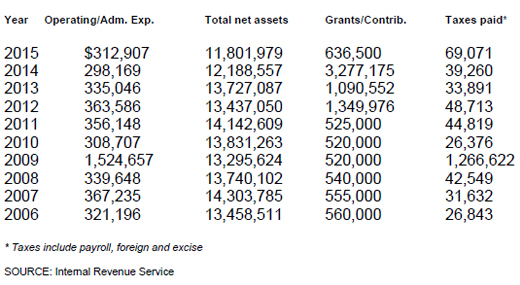Greater Peoria has more than 630 nonprofit enterprises, according to Nonprofit Explorer data from the investigative journalism site ProPublica.org – from the Caterpillar Foundation and the Creve Coeur Club to Forest Park Foundation and the Tri-County Urban League. However, few have had the quiet impact on key cultural institutions as the Bielfeldt Foundation, formed in 1985 by Gary and Carlotta Bielfeldt as a mechanism to “benefit Peoria.”
Gary, 80, prospered in the bond market in the 1980s; he and his wife Carlotta, also 80, are University of Illinois alumni and have been Bradley University trustees.

Carlotta Bielfeldt, executive director of the Bielfeldt Foundation. (PHOTO BY BILL KNIGHT)
Seated in a comfortable corner office in a second-floor suite in a brick building on Prospect Road in Peoria Heights, Carlotta presides over its operations as executive director,
“Early on, we made a great many small gifts,” she says, “everything from music to human services. A lot of people were happy and did good things [but] there are so many good causes [and] you can’t solve every problem. You’d love to just ‘feed the world,’ but you can’t do it [so] we’re trying to make a difference in certain things in this area that would really make a difference.”
Bielfeldt Foundation (BF) president Doug Stewart, recently retired from PNC Bank, echoes Carlotta’s observation.
“We’re not doing a lot of small grants, but looking at where the Bielfeldt Foundation can make a major impact on organizations,” he says, Carlotta adds that, “We have not taken applications in the last few years because we’ve had projects to complete, ongoing projects and multi-year pledges.”
A snapshot of the last decade of the BF shows that it made 40 contributions totaling $9,574,203 to 10 recipients, from Peoria Academy and the Riverfront Museum to foundations at Methodist Medical Center and Eureka College. Although that means the average grant was $239,355, that’s skewed by larger gifts to Peoria Academy and the Peoria Zoo (where Carlotta co-chaired the Peoria Zoological Society’s 2004 Capital Campaign and the Bielfeldt’s son David is its president). After accounting for a total of $3.3 million in three donations to Peoria Academy in 2012, 2013 and 2014, and $4,503,000 granted to the zoo over 10 years, the median (or mid-point) of BF grants is about $100,000.
Besides the zoo, the only other recipient of BF generosity each year over the last decade has been United Way, which has received $210,000 over that period. A Massachusetts foundation researching Cushing’s syndrome, and the Boy Scouts each received one grant between 2006 and 2015 (the last year that IRS forms 990-PF were available). The Peoria PlayHouse children’s museum and Eureka each received two BF grants; Easter Seals, Methodist and the Peoria Academy got three each; and the Riverfront Museum and its predecessor Lakeview received five grants.
In earlier years, BF contributions were made to the RiverPlex project, Bradley University and others. Those years also saw the low-profile foundation get unwanted attention when a dispute arose in the 1990s with the IRS over how much the family benefited compared to grants given. The issue was resolved “about three years ago,” Stewart says, after “a lot of negotiations.”
Kaci Byford of the University of Oklahoma College of Law, citing a report in The Nonprofit Times, summarized that “the Bielfeldt Foundation [directly or indirectly] paid family members $21 million over 17 years, while spending $25 million on charitable causes.”
Carlotta’s $85,000 annual pay, according to foundation tax returns, hasn’t changed in 10 years. Declining to detail the outcome of the dispute with the IRS, Carlotta sighs, smiles and says, “It took a very long time. But it’s over. That’s it.”
Stewart says besides that settlement, the board recently reached another turning point.
“We came to a point where we’d honored all the pledges that we had made and [asked ourselves], ‘Do we continue this in perpetuity or do we take the remaining corpus [capital] and benefit the community one last time?’
“The board came to the conclusion that we really want this to go on,” he continues, “so we’re open for business.”
Besides Stewart, the BF board includes Bradley University CFO Gary Anna, retired CPA Bill Barrick and retired Caterpillar attorney Estella Vallejo, who recently replaced Jane Converse of Converse Marketing. They all serve one-year terms.
“We have people on the board who know what’s going on or what groups are attempting to do, or what the real problems are,” Carlotta says. “We hear of projects or ideas that are coming forth. We do not make grants to individuals; we don’t give individual scholarships, etc. – [and] if it’s intriguing and a need that we see as really good for the community, we might really consider it.”
The board looks at “the issues and opportunities,” says Stewart, who speculates on how philanthropists might contribute.
“What’s going to happen to public television?” he asks. “That’s a quasi-not-for-profit. We’ve not discussed it, but that might be a more appropriate thing that we would look at and say, ‘If they have to go it alone…’ That might be a situation of interest to us.”
Carlotta summarizes BF’s future: “The focus of the board has been to look for community needs or area needs and step in. We’d like to be proactive when the time comes to make major gifts, major pledges.”


Recent Comments